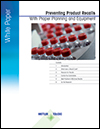Whitepapers
Reverse Logistics
FILTER BY CATEGORY
- 3PL
- 4PL & LLP
- Automation
- Barcode & RFID
- Bulk
- Canada Logistics
- Chemical Logistics
- Cold Chain Logistics
- Customs Compliance & Duty Drawback
- Data Analytics
- Data Management
- Demand Planning & Forecasting
- Distribution Center Management
- Drayage
- E-Commerce
- Education
- Finance
- Fleet Management
- Food Logistics
- Freight Forwarding
- Freight Payment, Audit & Billing
- Fulfillment / eFulfillment
- Global Logistics
- Global Trade
- HazMat
- Intermodal
- Labor Management
- Last Mile / Final Mile
- Lift Trucks / Forklifts
- Logistics IT
- Materials Handling
- Moisture & Temperature Control
- Ocean
- Package Delivery
- Packaging
- Parcel
- Ports
- Printers & Labels
- Rail
- Real Estate
- Refrigerated Warehousing
- Retail
- Retail Logistics
- Reverse Logistics
- Risk Management
- Robotics
- Routing, Scheduling & Shipping Technology
- Security Solutions
- Site Selection
- Small Package Services
- Sourcing & Negotiations
- Supply Chain Execution
- Supply Chain Management & Optimization
- Supply Chain Mgmt/Optimization
- Sustainability
- TMS
- Transportation
- Transportation & Freight Management
- Trucking
- Trucking-LTL
- Trucking-TL
- Vendor Compliance
- Visibility
- Warehousing
- Wireless/Mobile Technology
- WMS
- Yard Management

Forward Thinking on Reverse Logistics
With more consumers buying online, managing returns becomes a challenge. And returns of large, bulky items are even more complex. End those headaches by letting DM Transportation handle those large parcel returns that FedEx or UPS won’t touch. DM can pick up from the consumer’s room of choice or curbside, or even break down and pack the item. What distinguishes DM from its competition is attentive customer service – DM contacts the consumer within 24 hours of the return order, and picks up within 48. Once it completes the pickup, DM can donate or recycle the item locally, liquidate it, return it to the vendor, or send it back to the retailer. Check out this video today and get started on improving your reverse logistics program with DM Transportation.

How Does Your Returns Process Affect Your Retail Business?
E-commerce has changed the way consumers shop and put a completely new spin on retail. To differentiate themselves in an ever-competitive market, retailers have chosen to focus on making the returns process faster and easier for consumers. But is it working? Inbound Logistics Publisher Keith Biondo, sits down with Brian Bourke of SEKO Logistics to talk about the new retail landscape and how to have many happy returns.

Preventing Product Recalls With Proper Planning and Equipment
This whitepaper informs manufacturers of the reasons and potential costs of product recalls. It details how these can be avoided and offers guidance on choosing the best solutions that can be incorporated into your product quality control programs. The whitepaper addresses five main questions: What does a recall cost? What are the main reasons for recalls? How do you control the controllable? What is the best practice to minimize recalls? What do you need to research?
